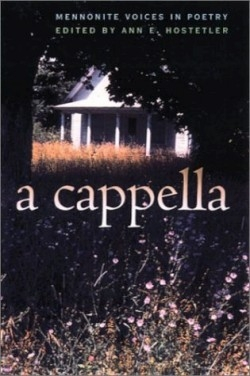A Cappella
Mennonite Voices in Poetry
One might think that an anthology subtitled Mennonite Voices in Poetry will contain only poetry typically associated with the mainstream culture’s perception of Mennonite imagery (rural) and subject matter (pacifist). However, the diverse subjects, multiple styles, and range in tone of these selections are delightful.
By using a broad definition for Mennonite poets, (those born into the Mennonite culture, those who retain a membership, and those who have strong influence from Mennonite culture), the editor was able to select twenty-four poets, some who do focus on rural life and peaceful practice, but many who offer a remarkably individualistic viewpoint and perspective, as well as an exploration of alternative lifestyles and settings.
That said, though these poems are not always united by cultural expectations, they are often united by a surprising theme. They seem to explicate best the consciousness of living in multiple worlds, of dualities and collisions created by the Mennonite philosophy of being “in the world but not of it.”
In these often elegiac pieces, there exists an acknowledgement of a complex history, coupled with how that history plays out in the contradictions of the twenty-first century. For example, in Anna Ruth Ediger Baehr’s poem, “I Will Not Pretend,” she writes, “These things are part of me / just as are the secret / meeting places in Holland, fields / of grain in Russia, the ancient / pitcher in grandmother’s kitchen, The books on my father’s shelves. // I am not two people, / but I have two peoples.” In the world of this collection, even the most spiritual folks must negotiate sometimes dysfunctional, complex, and often violent experiences.
In addition, readers will find poets playing with form and sound in fresh ways. Patrick Friesen’s long poem, “clearing poems,” with its kaleidoscope imagery and energetic line, offers readers intriguing juxtapositions of setting and idea. Further, Hostetler garnered several writers known for their award-winning work in other areas. Jazz poet Betsy Scholl and honored novelist Janet Kaufman show up with surprisingly close ties to the Mennonite world.
Editor Hostetler teaches English and creative writing at Goshen College in Indiana. Her poems have appeared in the American Scholar, Cream City Review, Mid-America Poetry Review, and other journals; her first book, Empty Room with Light, was published in 2002.
The final characteristic that makes her collection a keeper is the inclusion of a clear introduction, page-long biographies of each author, and a particularly insightful and scholarly afterward in which Hostetler places these poems in a contemporary and changing world where the “selves” of each poet are celebrated and analyzed in the context of this spiritual ideology. Most important, these poems make readers aware of how whole and good it is to have a Mennonite influence in American literature.
Reviewed by
Anne-Marie Oomen
Disclosure: This article is not an endorsement, but a review. The publisher of this book provided free copies of the book to have their book reviewed by a professional reviewer. No fee was paid by the publisher for this review. Foreword Reviews only recommends books that we love. Foreword Magazine, Inc. is disclosing this in accordance with the Federal Trade Commission’s 16 CFR, Part 255.

